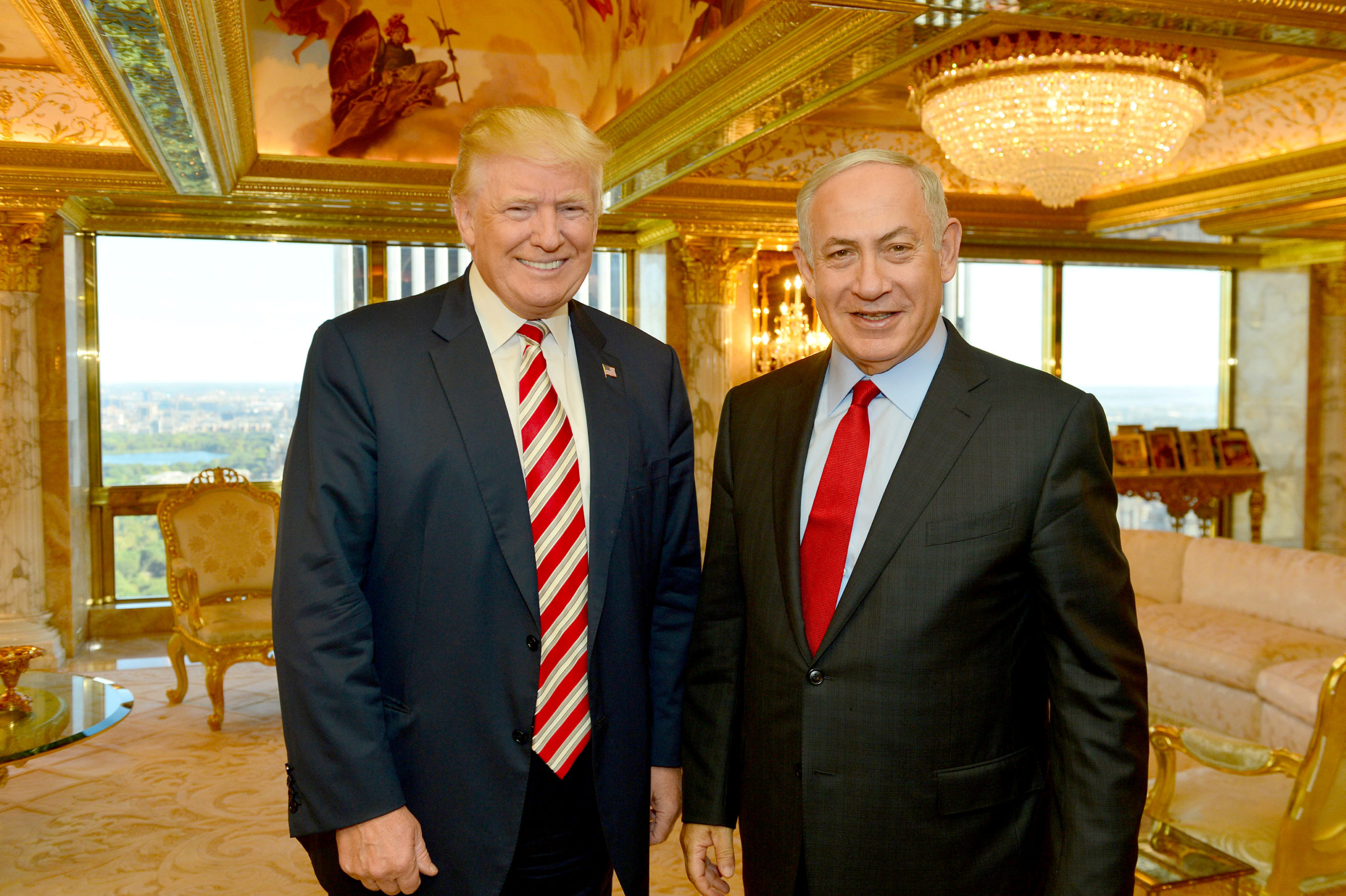 Israeli Prime Minister Benjamin Netanyahu (R) stands next to Republican U.S. presidential candidate Donald Trump during their meeting in New York, U.S., September 25, 2016. Kobi Gideon Government Press Office (GPO)/Handout via REUTERS/File Photo
Israeli Prime Minister Benjamin Netanyahu (R) stands next to Republican U.S. presidential candidate Donald Trump during their meeting in New York, U.S., September 25, 2016. Kobi Gideon Government Press Office (GPO)/Handout via REUTERS/File Photo - What is the main purpose of the meeting between the new president and the veteran Prime Minister?
To demonstrate that a new chapter is about to be written in US-Israeli relations – a chapter different from the one written by the Barack Obama administration. President Trump might not feel obliged to deliver on all of his promises towards Israel (see his recent remarks on moving the US embassy to Jerusalem), but he does want to signal to Israel and to the world that the days of friction are over. At least for now.
- What does Trump want from Netanyahu?
Time and understanding. No surprises, no taking for granted Trump’s support for every move, no taking advantage of the early days of an administration that doesn’t yet know what it is doing. He also wants to know what’s really important for Israel (and why) and what issues can be negotiated.
- What does Netanyahu want from Trump?
The list is long, but it begins with something that both leaders want: a signal that the US and Israel are once again on the same page, and a signal that the US intends to go back to a no-daylight policy towards Israel. That is, to coordinate as many moves as possible and prevent a situation in which differences are aired in public. On principle, Trump is going to agree to this. But his character might be an obstacle to implementing it.
- What about the substantive issues – what’s the top priority for Israel?
Geostrategic matters, starting with Iran. Israel would like to ensure that Iran does not get an opportunity to strengthen its hand further because of America’s lack of interest, commitment, or understanding of the situation. A delicate matter that needs to be discussed between the two leaders is Russia’s involvement in Syria and what it means for the US and Israel’s wish to see Iran contained. Netanyahu would like to present to Trump the opportunity that exists in bolstering the cooperation between Israel and the Sunni Arab states (Saudi Arabia, Egypt, Jordan) and the importance of this unofficial makeshift coalition for the containment, or even rolling back, of Iran.
- What about the nuclear agreement?
Netanyahu is under no illusion that the agreement will be promptly abandoned by the US. So his hope is to see two possible developments: 1. A more robust policy by the US concerning issues that were not covered by the agreement (Iran’s support for terrorism, Iran’s missile program), 2. An intention to see the agreement extended beyond the 15 year period it currently covers, after which Iran is pretty much free to become a military nuclear power.
- You haven’t mentioned the peace process with the Palestinians…
The peace process – or the relations with the Palestinians – is not high on Netanyahu’s agenda. But it will surely be discussed. Netanyahu is going to argue that a better approach to this issue is looking at it from a regional perspective – namely, as one of the things that a more robust alliance involving Israel and the Arab states, and supported by the US, can deal with. The Palestinians need Arab support, without which they are not likely to make any significant move towards peace. Israel needs to see a benefit in negotiation beyond being nice to the Palestinians. If the Palestinian issue is one item of a broader Middle East peace agenda, that might work.
- And settlements?
On settlements, and President and the Prime Minister can easily agree. If one carefully reads Trump’s language on this issue, one realizes that this President is ready to go back to an arrangement similar to the one agreed on in the Bush-Sharon letter. That is: Israel can build and develop the main settlement blocs, but can’t build new settlements. Such an understanding would benefit Netanyahu in two ways: 1. It will give him something tangible with which to demonstrate to Israelis that he achieved something. 2. It will give him a way of demonstrating that his more adult-like approach to dealing with the settlement issue bears more fruit than the confrontational approach advised by his critics on the right, especially by Jewish Home party leader Naftali Bennet. For the president, this could be an easy way to demonstrate that 1. Trump is no Obama (whose administration did not accept that Bush-Sharon understanding as valid) and 2. That he takes a middle-of-the-road, pro-peace, and pro-Israel stance on this issue.
- Do you expect this to be a positive meeting?
Sure. You might remember that the first Obama-Netanyahu meeting was quite contentious. So for Trump to have a positive first meeting with the Prime Minister is the easiest path to showing that things have indeed changed in US-Israel relations. For Netanyahu, it is essential to have a positive first meeting, as one thing is clear: getting on Trump’s wrong side is not a recommended policy.
- Do you expect any surprises?
This is Donald Trump. Surprises are no longer surprising.























 More news and opinions than at a Shabbat dinner, right in your inbox.
More news and opinions than at a Shabbat dinner, right in your inbox.